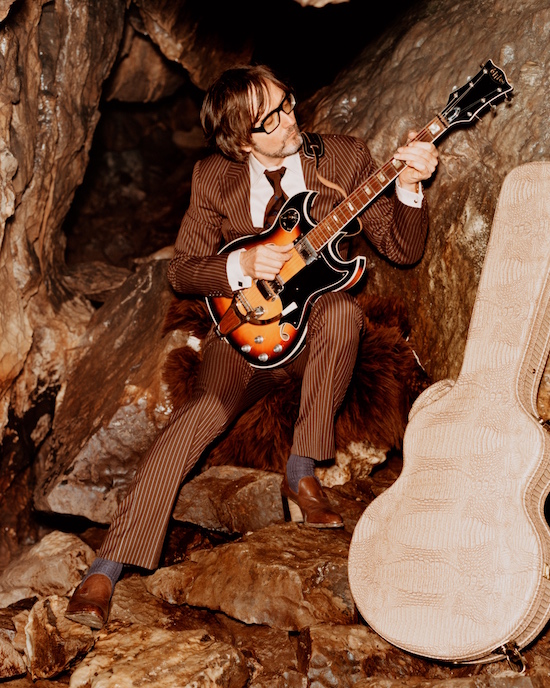After the demise of Pulp in 2002, Jarvis Cocker’s process of finding his feet as an artist in his own right was an unhurried one. He dressed as a skeleton as part of Electroclash-era project Relaxed Muscle, released the well-received solo albums Jarvis and Further Complications, and collaborated with pianist Gonzales. This was all fine fodder for the Pulp faithful, but it was arguably with his 6 Music show The Sunday Service that Cocker started to reach a fresh audience with something entirely new. The programme, broadcast between 2010 and 2017, was a laid-back yet never cosy, sonically diverse accompaniment to the nation’s post-roast slumber. "There was a direct inspiration for the Sunday service from when I was a kid," Cocker reflects now, "I was doing an interview just before the This Is Hardcore album came out, and we got onto the subject of hangovers. The journalist said the best thing to do if you’ve got a hangover is to listen to the Desmond Carrington programme on Radio 2. It was easy listening or whatever but he used to play quite unusual things by people I’d never heard before, and it tended to be on the more mellow end of the scale. I think I was quite heavily influenced by that."
In a final farewell to the programme Cocker is releasing a compilation of favourites from its early years. The selection process was perhaps surprisingly simple – he says that the idea to produce a compilation came soon after they started doing the Sunday Service, it’s just taken a while to come to fruition. "I think I came up with the tracklisting a year or two after I started doing the show, which is why a lot of them are from the early period. It’s been hanging around for the best part of a decade, but thankfully Ace Records got involved, and especially Liz Buckley who took the bull by the horns and managed to get all the clearances. It’s been, appropriately enough, a long, slow and not always mellow process"
Radio has always been a key part of Cocker’s musical ecosystem. "The radio was the first thing for me, my mum would always have it on in the morning when she was getting us ready for school," he says, reminiscing on his tender introductions to music in 1970s Sheffield. "To other people it might be mass-produced rubbish, but because it was the first thing and I was lucky enough to be born in a time when pop music was having a bit of a golden age and people were doing interesting things within it, it had a massive influence on me." This still has an impact today, as Cocker prepares to release his first album with his new project, Javis Is. "It’s still the same now – I’ve just been having a lively discussion with my manager about how my new songs are too long," he admits, "I take her point as they are kind of long, but they’ve still got the structure of pop songs, I still write a chorus and a middle eight, and really that’s ingrained in me because the songs I heard listening to the radio as a kid were like that, verse chorus verse chorus middle bit chorus. To me that’s the foundations of songwriting, it’s in me at a molecular level. Even though the songs I’m doing now are a bit longer they do that. I like to have a chorus. That’s what excites me."
In his new band, Cocker has arguably been making his best music since final, and underrated Pulp album We Love Life. With gigs in underground caverns, a standout headlining set at End Of The Road Festival and the pacey, unwinding heaviness of brilliant new song ‘Must I Evolve’, Cocker’s return to focussing on music is welcome, and timely. Pulp always cut through the bullshit of Britpop with a direct, honest, uncomfortable exploration of class, sex and Englishness. If some of its b-sides had been included on the main record, This Is Hardcore might now be seen as a prescient indictment on the disappointments and failures of New Labour. Where does Cocker fit into our current grim political climate? "The song we’ve been finishing the tour dates with is ‘Cunts Are Still Running The World’ – maybe you have to be a cunt to want to run a country, maybe it’s a feature of Englishness that’s coming to a head, and the most positive thing I can say is that maybe by coming to a head, like a boil, it will burst and eventually disappear," Cocker says, before looking back to the heady, strange days when Pulp were a household name, before going off on one: "That’s what was so distasteful of the false dawn of the Labour government of the 1990s, you wanted something to happen but it seemed they were just intent on appropriating all that horrible Cool Britannia stuff," he reflects. "The good creative things that have come through in this country have always been in opposition to the status quo and ruling class, and that’s just a fact. It’s always going to be like that, so it really sticks in the throat when they then try and take credit to it or cosy up to it, it’s just not right. Music is a form of protest because music is against all that, just naturally. It doesn’t have to be a political song, it’s just because you respond to it on an emotional level which has nothing to do with breeding or class or how much money you’ve got, you just like the song internally. Music makes you realise that stuff is just a load of rubbish."
Jarvis Cocker’s Sunday Service compilation is out now via Ace Records. Stay tuned for more news from Jarv Is, and click the image of Jarvis below to begin reading his Baker’s Dozen selections


